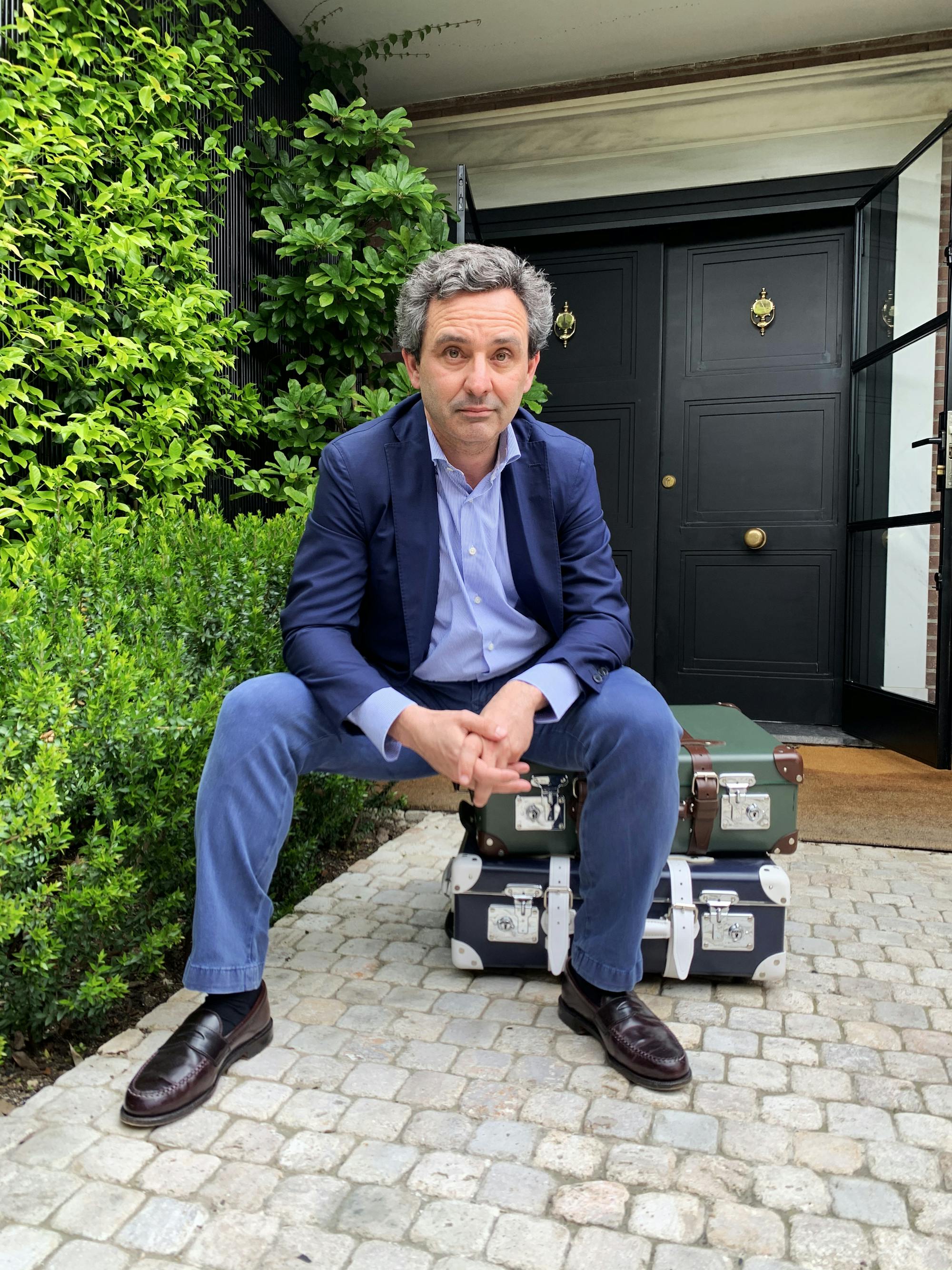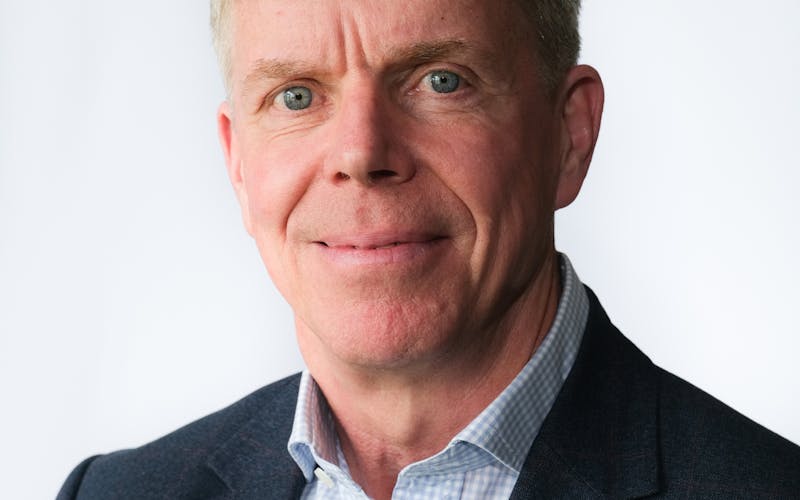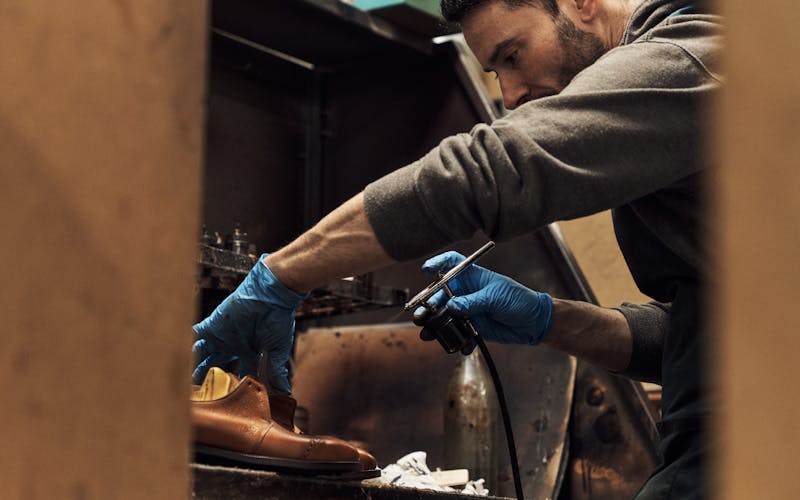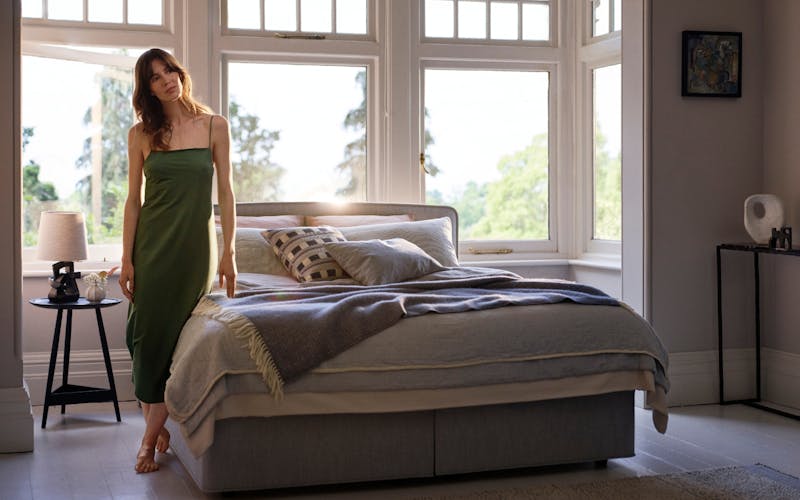

for Walpole members and
non-members available now
at The Londoner



Castellano is a Spaniard, but he’s also something of a paid-up Anglophile. He was MD of Hackett for 10 years from 2005, when the Spanish family-owned investment firm he was working for, Torreal SCR SA, bought it from Richemont. Under his stewardship, it multiplied to eight times its size by 2015, when it was sold to L Capital, a subsidiary of LVMH. Today, Castellano lives in London and is Operating Officer of British private equity firm Oakley Capital. Since February he has also been executive chairman of Globe-Trotter, the 123-year-old British luxury luggage company.
"We did not only buy Globe-Trotter for what it is now but for what it could be in the future, so the price was not the only consideration," says Castellano by way of explaining why the deal went through smoothly despite the extraordinary circumstances. "And if the purchase was a good idea before coronavirus, it will still be a good idea after."
Castellano has been trying to buy Globe-Trotter for five years now. Like a Spanish luxury Captain Ahab in pursuit of a white whale with leather straps and rivets, he is not embarrassed to admit that it became something of an obsession with him. "I travel a lot, and for me the brand has everything for someone who loves to travel and is curious about the world – it really embodies the romance of travel."
In the Globe-Trotter store in Albemarle Street there is a picture of Captain Robert Falcon Scott in his hut. Behind him, under his bed, is his Globe-Trotter. Edmund Hillary, the man who first climbed Mount Everest, used Globe-Trotter, as did the Queen for her honeymoon luggage in 1947. And Winston Churchill had a Globe-Trotter Dispatch Case when he was Chancellor of the Exchequer in 1924. But it’s not just decades-old stories Castellano can tell about his new train set – Globe-Trotter has been seen in the hands of Eddie Redmayne, Angelina Jolie, Kate Moss and David Beckham, and it made 007’s luggage for Spectre and has reprised the role for the now postponed No Time to Die.
However, Castellano is keen to point out that though heritage is important, the other thing that most attracts him to Globe-Trotter is that it is identifiably unique. "I enjoy people stopping me in the airport and asking me where I got my beautiful case," he explains. "It is an unmistakably recognisable product. And the incredible thing is that the recognition doesn’t depend on logos or monograms or patterns – it’s the form of the actual product that is its distinctive feature. That makes it very special.’"
He cites the fact that Oakley Capital also owns Alessi, the Italian home products company, which similarly makes identifiable pieces, on account of their eclectic design. "I feel so lucky to be involved with Alessi," says the Spaniard. "It is one of the best examples of how to make something that you have to use every day beautiful. But without branding. You don’t have an ‘A’ all over the place. The branding is in the design. If you go to the Design Museum in London you have a wall of iconic design objects. Alessi has five pieces on display there."
And Globe-Trotter is the same? "Yes. Like an iPhone. They have been copied a lot, but when you see an iPhone you know it is an iPhone. That really makes a difference." He talks of the proof of this unique status in the way in which brands as diverse as Comme des Garçons and Hermès have done Globe-Trotter collaborations over the years and how, at present, the firm makes – as an acknowledged partner – products for Gucci and Berluti. "It definitely says a lot to see great brands such as Gucci and Berluti come to Globe-Trotter for the real thing; brands that frankly could produce whatever they wanted. They want a proper collaboration, a real partnership; they want the authentic Globe-Trotter product."
When we talk, Castellano is locked up with his family in Madrid, which is in the grip of Covid-19. He has been out only twice in 20 days. "It’s a very odd situation. People wear masks. I used to travel a lot to Japan and you see it there; but when it is in your home town it’s a real shock. Madrid looks like a different city at the moment – deserted. You feel like you are living in a place that doesn’t belong to you."
The sentiments are ones we can all relate to now. But what is striking when talking to Castellano is his focus on the future. He admits that in the short term, of course, Globe-Trotter will take a big financial hit. The factory has closed, as have the stores. And people are not allowed to travel, so purchasing luggage is not exactly a priority. But he is sanguine. "In some ways the timing is OK for us. This year was always going to be a transition year. What we have bought is a really incredible brand but we do have to remove a little bit of the dust. We need to do some work on the product, just minor things to make it more practical. And we will be looking into innovative materials."
This makes sense. In its early days, Globe-Trotter was an innovator. Luggage was heavy at the time, so when the firm came up with the idea of using light but strong vulcanised fibreboard, it was a game changer. Today, the firm prides itself on making luggage pretty much from the same materials and in the same way that it always has. But what was once cutting-edge is now vintage. There have been some developments, though, like limited-edition carbon-fibre versions of the product. Is this then what he means by R&D? "It’s actually more to do with things like wheels," says Castellano. "We’re not ever going to be the hi-tech luggage of the world. But we are going to be the most beautiful, which, actually, I think we already are – we just need to make the cases a little more practical to use. And we have to develop a new website and digital concept. So we were not expecting to grow this year, but instead were going to put in work on the back end, preparing for the future. That part of the plan is not affected by the current situation, beyond some basic issues with parts supply."
For Castellano, lockdown is then an opportunity. "We have been forced to stand back – it’s been enforced even – and ask questions. I didn’t want this opportunity, it was not part of the plan, but now it is here, we should use it positively. So what could be the best possible product, what is the best possible vision for the brand? Of course, I would love to have my newly purchased company running now, but if I can’t, then at least I have everybody focused on the strategy."
He sees this as something that all businesses – not just luxury ones – could benefit from. Away from the daily demands, it is possible to step back and look at the future differently. And, if necessary, reset. "If you really think about it, this is a really good opportunity to restructure the business; rethink your business model. You’ve never had the opportunity to almost start again from scratch. You’re always caught up in an ongoing process." You can see his point – the world has been changing rapidly for the past decade at least, especially in terms of the impact of digital on all our lives. "Maybe coronavirus gives us the opportunity to focus on decisions that we would have to make anyway? Let’s rethink. Let’s analyse. Different countries, different markets. Does what we do and how we do it make sense in the new world?"
Does he mean he will rethink the role of stores versus digital, perhaps? Will people have become so accustomed to shopping online that the lockdown will hasten the further demise of bricks and mortar retail? ‘Not necessarily. When everyone talks about the end of real-world retail I always say, people are obviously shopping more and more online, yes, but you still see incredible concepts that are driving people to the store; in some cases, they are queueing to get in. So maybe the virus will be the last strong push – it will mean, OK if you are not doing an incredible customer experience in store that is different, exciting, I am not going to come. This was happening already, but the current situation will accelerate this."
Will Globe-Trotter still want to be in stores then? "For a long time now a store has not just been a way of selling a product. It should be a way of giving a customer an experience. And let’s face it – I have girls that are 16- and 13-years-old and what they love to do on Saturday afternoon is to go to the King’s Road. I don’t know anyone who tells me in the office “I was shopping on MR PORTER at the weekend and it was amazing.” They can tell you they went to the Chanel store and it was amazing, sure, but when was the last time someone said to you at dinner: "I was in Amazon and it was incredible?’’"
So it sounds like Castellano has a plan, and it is one that will be honed by the experience of these months of lockdown but not massively altered by them. "Honestly, the real threat for us at Globe-Trotter is how long it is going to take until the travel market comes back," he confides. And his gut feeling? "I think at the end of this year we will see a market adapted to the new reality. And we at Globe-Trotter will be ready for that with new products and a new strategy."
Talking to this 49-year-old Spaniard I feel I am listening not to a financier, but someone who is much more entrepreneurially minded. From Oakley Capital’s beautiful townhouse in Chelsea, I have the idea that he and his colleagues are looking at brands not with a view to swallowing them up and stripping them back to turn a quick profit, but with the idea of building them. I ask him if this is true? "Yes absolutely. Up until 2000, my background was finance and I used to work in the stock market, but then I decided to get into private equity. There is a famous book of that time called Barbarians at the Gate which was all about the beginnings of private equity, and if you read it, you see how it was an idea that was born out of entrepreneurialism.”
These days, of course, it can get a bad rap. Especially where luxury is concerned, where there can be a perhaps inevitable tension between the idea of nurturing a brand and a five- or six-year exit. Indeed, not so long ago it looked like there had been something of a cooling-off in private equity’s desire to invest in fashion brands, which often prove volatile in their performance, but at the end of last year there were signs that the interest was reviving. Castellano has, of course, had invaluable hands-on experience at Hackett and acknowledges that luxury and fashion requires investors to be more patient than they would perhaps be in other sectors: ‘The only way to build luxury is to be in it for real. That’s why coronavirus is not relevant to Globe-Trotter. The only thing it changes is the pace of IRR [internal rate of return]. Maybe now it will take a couple of years more than we expected to reach our targets. But that is OK."
So Globe-Trotter is a good bet? "For sure. It’s a good bet because it’s an incredible asset with a really unique history, and displays great craftsmanship. And so it represents something valuable. I really think that it is true that people are going to think much more about their spending in the next few years. They’ll want special things, not just another T-shirt or pair of jeans. Something that is worth investing in."
And when does he think travel will bounce back? "Early. There’s a debate, of course, and nobody knows, but I would say early. Airlines are huge businesses, so they have an interest in getting people moving, and places like France and my home country, Spain, need tourists to start coming again." Castellano admits that things may look different. We may have to have our temperatures taken at airports, as happened in some places during the SARS outbreak, or even demonstrate somehow that we have the antibodies, but essentially he believes travel will be one of the first things that we will do. The theory is partly to do with basic psychology. Just as if you are told you can’t do something there is a human instinct that makes you want to do it more – think of the bouncer at the nightclub scenario – people deprived of freedom of movement will want to exercise that freedom as soon as they can.
"Everyone loves travelling and discovering new places. And people who can’t afford to do it satisfy the desire through magazines, books, videos. It’s the human spirit. We like to travel and see new things. Even those of us who are lucky to have travelled a lot, and I count myself among them, the first thing I will want to do is get on a plane and go somewhere. I believe it’s a global sentiment."
I can sympathise. The other day I found a picture on my phone that had a surprisingly emotional effect on me. It is of four men of a certain age in a restaurant in the north of Milan that used to be a working man’s club. Called the Osteria del Biliardo, it still has the original décor, complete with billiards tables, and the group of friends are standing next to one, illuminated by the overhead lights and looking like some ageing garage band. I am on the right of the group, and the picture was taken just before Milan became a ghost town, during fashion week in February. It seems almost inconceivable that this was only a few weeks ago.
When I came across this image of happier, unconstrained times, my first thought was I cannot wait to get back there, with those three, and toast our liberation. Castellano is right. Travel doesn’t have to be about holidays – though frankly my family verges on the hysterical whenever we discuss our much anticipated summer break in France and the odds of it happening or not – it is more broad than that. Because travel is at root about personal freedom.
"Our purpose," says Castellano, "comes from the uniqueness of the product and our heritage, which allows us to make Globe-Trotter the partner for those who see travel as a dream. And to help make those dreams happen. This is what aspiration really is all about. It’s what luxury brands do: luxury is not about the price, but about what the product represents for you. It’s about dreaming. You don’t buy a handbag from Hermès just because it is a beautiful bag. You buy it because it embodies a dream of a chic lifestyle and attitude, it is not simply a handbag. And like Globe-Trotter, Hermès is a showing brand, not a show-off brand. And I like that."
I wonder, is there a peculiar Britishness in this idea? The British dream of exploring the world – the Grand Tour, the great outdoors, Wordsworth walking in the Lake District, Shackleton on the ice in the Antarctic, even Richard Branson and his hot air balloons! And surely Britishness is also to do with showing and not showing-off – that famed national characteristic of reserve?
"Britishness is key," declares Castellano. "It’s part of the DNA." (Though for pedants its worth pointing out that Globe-Trotter was originally founded in Saxony in Germany in 1897 and moved to our shores in 1932.) "When I came to run Hackett, one of the first things I did was bring [founder] Jeremy Hackett back into the business to make it as British as possible, and to develop as much product in the UK," explains Castellano. "Manufacturing there was more of a challenge, but we certainly bought British fabric from places like Fox Brothers."
Globe-Trotter, however, has a factory in England. "We definitely bought the brand because we really believe in what it stands for, and Britishness is central to that,’ says Castellano. "My intention is absolutely to showcase that and be proud of it. We will continue to produce in England where we have a factory making everything by hand. It’s a real privilege."
It is also a powerful marketing tool. "Made in England and the Royal Warrant seem to be much more important for people who are not British or even not European. It means a lot to people in Asia and in America." And Japan, where Globe-Trotter has a healthy reputation and business on account of its previous owner, Toshiyasu Takubo, who purchased it in the late '90s and fostered the brand in his home country. Takubo is still involved as executive director, says Castellano, who holds him in high regard for the way in which he stayed true to the brand’s heritage and values for his 20-year tenure at the helm.
"It’s interesting," says Castellano, "but in Japan though stores are closed, and will be for a month until mid-May, work cannot be stopped. People keep going to the offices. This is because after World War II the constitution doesn’t allow the government to forbid people to move. But out of home, the Japanese are very disciplined, and follow social distancing. The problem Globe-Trotter has there – and the problem for the entire Japanese economy – is when are we going to get the Chinese tourists back?"
In the meantime, it’s all product development and brand strategy for Castellano. Barring any major surprises, the Globe-Trotter factory in Hertfordshire will reopen soon he says, probably sometime in May, with social distancing in place for workers so their safety can be guaranteed. There is a backlog of production to be cleared, and then it’s all about gearing up for the travel bounce back he sees on the horizon.
globe-trotter.com





